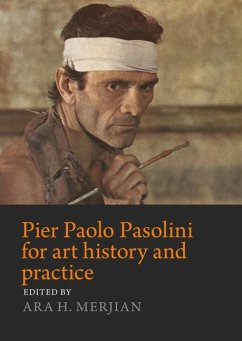Pier Paolo Pasolini (1922-1975) remains best known for his influential cinematic and literary works. These attest in turn to a crucial early formation: Pasolini's intermittent practice as a painter, critic, and historian of art. Spanning the fifth-century BCE to the early twenty-first century, this volume's chapters reflect the breadth of Pasolini's aesthetic commitments and predilections, from Greek Attic vase painting to the to the spread of Caravaggism; from folkloric ethnography to the painting of Pablo Picasso and Andy Warhol. Alongside essays examining his influence on twentieth- and twenty-first century aesthetics, artists of different nationality, gender, and generation address Pasolini's continued consequence for their own work. The very notion of a politically engaged artistic practice owes a debt to Pasolini's oeuvre - one he called "extravagantly interdisciplinary," and which finds incisive reflection in the media, methods, and subjects addressed in these pages.
Bitte wählen Sie Ihr Anliegen aus.
Rechnungen
Retourenschein anfordern
Bestellstatus
Storno

